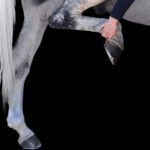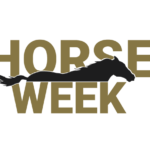 Four-in-hand champion Chester Weber and his girlfriend My Larsson | © Nancy Jaffer
Four-in-hand champion Chester Weber and his girlfriend My Larsson | © Nancy JafferSeptember 21, 2003 — The U.S. Equestrian Team’s Four-in-Hand Championship, which wrapped up today at the Gladstone Driving Event, didn’t turn out to be suspenseful — but it was hard-fought.
When Chester Weber told me he wanted that handsome silver trophy, I had little doubt that the ambitious and intense Floridian would get it, despite the fact that he was facing one of the best fields in years for the competition.
Participants included Chester’s pal, Tucker Johnson, the reigning champ who got his title by finishing fourth at the world championships last year; Jimmy Fairclough, and Bill Long, both past champions multiple times. New to the mix was Jim Richards, the man you may know as the founder of the Foxhall Cup three-day event in Georgia. Jim hurt his back in a polo accident a few years ago, and as a result, cannot ride. Though he and his wife Julie have a number of event horses (Julie was in the 2000 Olympics as an individual rider), Jim was itching to be a participant rather than a spectator. So he’s under the tutelage of former world champion Tomas Eriksson of Sweden. Jim has big dreams, the ability to bankroll them and the determination to make them come true.
For the moment, however, he’s still on a learning curve, so it was no surprise that he finished fifth and last in the section with a very respectable performance for only his second advanced event.
Since this is not a world championships year, drivers are bringing along their best prospects and doing a lot of training. There’s plenty of mixing and matching when it comes to four-in-hands, as leaders and wheelers may switch sides or positions, or swap out with spares until their trainer figures out the best combinations for dressage, marathon and cones.
 Advanced single horse division winner Scott Monroe | © Nancy Jaffer
Advanced single horse division winner Scott Monroe | © Nancy JafferTucker was working with a new team, horses he bought in Germany at the end of last year that did not arrive here until January, and had no real background in driving until he started training them. Jimmy has a new leader, King, who went to the World Singles Championship with David Wharton of Canada, and Bill Long had just put together his first team in three years under the sponsorship of Patsy Wooten, also a driver.
Of the group, Chester (at 28, the youngest driver, by the way) had horses with the most mileage, reflected in the fact that his record for the year was five victories in five starts. And when he sets a goal, he achieves it, leaving nothing to chance. Though he won the dressage phase here and lost the marathon to Tucker, he was still ahead — 139.7 penalties to 146.39 for Tucker, when it came time for the cones today. It wasn’t an easy route, but time did not turn out to be a factor for the fours; none of them exceeded the 4-minute time allowed.
Still, Chester took nothing for granted. He says he has studied the deliberative and successful Swiss approach to cones, pacing off distances repeatedly so he knows exactly how fast he needs to go to finish within the time allowed and keep those little balls from plummeting off the top of the cones.
Tucker had two down, which dropped him in the standings to the spot beneath Jimmy, who drove with him and Chester on the silver medal team at the World Equestrian Games last year. While he was able to make smooth turns at speed in the marathon, a feat that was within his team’s capability, the tighter confines of the cones course meant there was no faking it there for Tucker. Jimmy’s more experienced horses had a penalty-free trip, which would make him the eventual reserve champion.
Chester, whose first serious trainer was Jimmy, had everything calibrated just right and finished without another mark against him to take his cherished prize. Tucker actually was prepared for this moment. He told me yesterday that he had brought along a magnum of Roderer Cristal champagne 1996 — the year Chester started competing in the fours — to spray over his buddy. That’s sort of the way they do it in the NFL lockerroom, but I guarantee this is better stuff. After all, Tucker is one of the Johnson & Johnson Johnsons, who flies from New Jersey to Florida at the controls of his own plane, and Chester’s family traces its lineage back to the founder of Campbell’s soup.
 Reserve four-in-hand champion Jimmy Fairclough | © Nancy Jaffer
Reserve four-in-hand champion Jimmy Fairclough | © Nancy JafferChester wanted to discuss some big news, and I thought he was going to say he had popped the question to his beautiful girlfriend, My Larsson, a Swede who competes in the lower levels of the jumper ranks in her homeland. But no, he was just itching to say he and Tucker had signed a contract to have former world champion Michael Freund of Germany train them through the 2006 World Equestrian Games at Aachen. Chester and Tucker want to be the nucleus of a gold medal U.S. team there, or perhaps next year at the world championships in Hungary, though that might be a bit too soon.
Gladstone was a wonderful event this year. It’s on the comeback trail, after its big backers found other interests several years ago, and the committee had to scramble for new funds and new blood to keep it going. But they’ve done it. They’re not bringing over drivers from Europe, of course, the way it happened in the old, monied days, or having black tie galas. Yet this dedicated group still runs a first-class competition at Hamilton Farm, home of the U.S. Equestrian Team.
David Hirsh, winner of the advanced pairs with his Morgan/Halflinger duo, yearned for a larger number of entries (there were just two in his division). Hurricane Isabel had discouraged some from coming, and the World Pairs Championship in France this weekend accounted for other absences.
“I hope all of my brethren support this event in the future,” he said, citing “the phenomenal effort” of the committee. “It’s worth coming just to do these hazards,” he said.
The Isabel thing could have been a disaster, but all we got in New Jersey, fortunately, was a few high winds and a little rain. Peter Gorry, co-manager of the show with Ellen Ettenger, had four contingency plans if Isabel struck. They ranged from shrinking the competition to a two-day event to cancellation and a week’s postponement. All were complete with scenarios for evacuation. Luckily, none of that came to pass, and after gray skies Friday, we really enjoyed sparkling weather yesterday and today. A new hazard in the main arena was a highlight of the marathon, making it more friendly to spectators who didn’t want to tramp around the property.
 Advanced single pony winner Sara Schmitt | © Nancy Jaffer
Advanced single pony winner Sara Schmitt | © Nancy JafferOther big moments included Scott Monroe’s victory in the advanced singles with his black Morgan, Shadow. Scott, who many believe was unfairly passed over last year for the world singles championship team, isn’t likely to suffer that hardship again the way his horse has been going.
“He’s a special horse, an exceptional horse, and he’s got a lot to offer,” said Scott. “He’s taken a lot of blue home from Gladstone.” He won dressage, the marathon and was clear in the cones to take yet another blue back to Connecticut with 121.07 penalties, to 142.94 for Diane Trefry and Miles to Go. Miles was on track to make the world singles team a few years back when he was injured. Diane, who used to be the navigator for Lana DuPont Wright, brought Miles back gradually. She has hopes of trying for the world singles, if owner Lana agrees, but she’s a Canadian citizen, so the neat Connemara/thoroughbred cross won’t be on our team.
The driving world is interesting, with a small enough cast of characters that you can keep track of them all. I should mention that one person who did so (in a way) is Barbara Weir, whose husband Jack used to run Gladstone. Barbara wrote a mystery novel about carriage driving called “The Fifth Wheel,” and it’s full of characters I thought I recognized. She grudgingly admitted some were based on real people, but said, “They’re all dead.” Yeah, right. It’s lots of fun to guess who they are, anyway.
Well, it was a memorable Gladstone. I love driving, and feel bad that there’s only one more big event left this year. That’s Fair Hill next month, and you can bet we’ll be there to tell you all about it.





